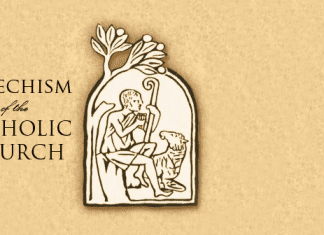Catechism of The Catholic Church #687
687 "No one comprehends the thoughts of God except the Spirit of God." Now God's Spirit, who reveals God, makes known to us Christ, his Word, his living Utterance, but the Spirit does not speak of himself. the Spirit who "has spoken through the prophets" makes us hear the Father's Word, but we do not hear the Spirit himself. We know him only in the movement by which he reveals the Word to us and disposes us to welcome him in faith. the Spirit of truth who "unveils" Christ to us "will not speak on his own.” Such properly divine self-effacement explains why "the world cannot receive (him), because it neither sees him nor knows him," while those who believe in Christ know the Spirit because he dwells with them.
Catechism of The Catholic Church #590
590 Only the divine identity of Jesus' person can justify so absolute a claim as "He who is not with me is against me"; and his saying that there was in him "something greater than Jonah,. . . greater than Solomon", something "greater than the Temple"; his reminder that David had called the Messiah his Lord, and his affirmations, "Before Abraham was, I AM", and even "I and the Father are one."
Catechism of The Catholic Church #199
199 "I believe in God": this first affirmation of the Apostles' Creed is also the most fundamental. the whole Creed speaks of God, and when it also speaks of man and of the world it does so in relation to God. the other articles of the Creed all depend on the first, just as the remaining Commandments make the first explicit. the other articles help us to know God better as he revealed himself progressively to men. "The faithful first profess their belief in God."
Catechism of The Catholic Church #748
748 "Christ is the light of humanity; and it is, accordingly, the heart-felt desire of this sacred Council, being gathered together in the Holy Spirit, that, by proclaiming his Gospel to every creature, it may bring to all men that light of Christ which shines out visibly from the Church." These words open the Second Vatican Council's Dogmatic Constitution on the Church. By choosing this starting point, the Council demonstrates that the article of faith about the Church depends entirely on the articles concerning Christ Jesus. the Church has no other light than Christ's; according to a favorite image of the Church Fathers, the Church is like the moon, all its light reflected from the sun.
Catechism of The Catholic Church #168
168 It is the Church that believes first, and so bears, nourishes and sustains my faith. Everywhere, it is the Church that first confesses the Lord: "Throughout the world the holy Church acclaims you", as we sing in the hymn Te Deum; with her and in her, we are won over and brought to confess: "I believe", "We believe". It is through the Church that we receive faith and new life in Christ by Baptism. In the Rituale Romanum, the minister of Baptism asks the catechumen: "What do you ask of God's Church?" and the answer is: "Faith." "What does faith offer you?" "Eternal life."
Catechism of The Catholic Church #637
637 In his human soul united to his divine person, the dead Christ went down to the realm of the dead. He opened heaven's gates for the just who had gone before him.
Catechism of The Catholic Church #428
428 Whoever is called "to teach Christ" must first seek "the surpassing worth of knowing Christ Jesus"; he must suffer "the loss of all things. . ." in order to "gain Christ and be found in him", and "to know him and the power of his resurrection, and (to) share his sufferings, becoming like him in his death, that if possible (he) may attain the resurrection from the dead".
Catechism of The Catholic Church #1022
1022 Each man receives his eternal retribution in his immortal soul at the very moment of his death, in a particular judgment that refers his life to Christ: either entrance into the blessedness of heaven-through a purification or immediately,-or immediate and everlasting damnation. At the evening of life, we shall be judged on our love.
Catechism of The Catholic Church #730
730 God created man a rational being, conferring on him the dignity of a person who can initiate and control his own actions. "God willed that man should be 'left in the hand of his own counsel,' so that he might of his own accord seek his Creator and freely attain his full and blessed perfection by cleaving to him." Man is rational and therefore like God; he is created with free will and is master over his acts.
Catechism of The Catholic Church #143
143 By faith, man completely submits his intellect and his will to God. With his whole being man gives his assent to God the revealer. Sacred Scripture calls this human response to God, the author of revelation, "the obedience of faith"














